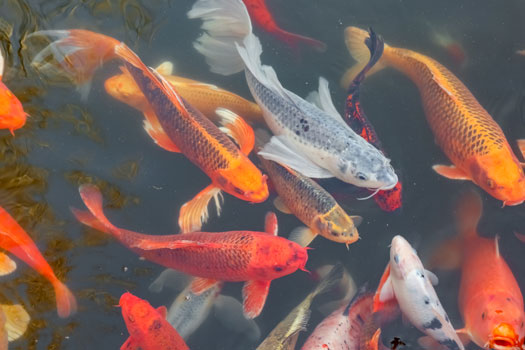- Your shopping cart is empty!
Is It Fine for Koi Ponds to Be Filled with Rainwater?

Natural ponds get their water through various sources. Some of them get filtration from small streams and aquifers, but most of their water supply will come from rain. In the case of garden ponds, fish keepers provide most of the water, and they’ll invariably use municipal tap water treated with dechlorination and beneficial bacteria, which are some of the most crucial koi pond supplies. A natural supply of ground water is nearly impossible for garden ponds with concrete or plastic liner bottoms. The exception would be uncovered ponds because they can get rainwater. It’s easy to assume rainwater would be beneficial to a koi pond, but this may not always be the case.
Rainwater Isn’t Always Pure
Water can be classified in three categories: precipitation, surface, and ground water. While it’s true that the basis of water is two parts hydrogen and one part oxygen, this doesn’t mean rain or melted snow consists of pure H2O. Hydrology researchers in North America have determined ground water is the purest of the three. Air pollution particles in gaseous form are known to be absorbed during the evaporation and precipitation processes, and this includes particles resulting from industrial contamination.
Rainwater May Lack the Adequate pH Level for Koi Ponds
Assuming rainwater isn’t overly contaminated, its pH level will be around 5 or 6 by the time is falls on a koi pond. For the most part, this is a safe level for organic life, but it’s not the most optimal for koi. Keep in mind carp species are healthier when they live in aquatic habitats where the water has an optimal pH level around 7, which means it’s slightly alkaline. Ponds located in regions with higher levels of carbon monoxide will experience more acidic rainfall, and this increases the potential of pH levels below 4, at which point water starts turning harmful.
Storing Rainwater for Koi Ponds
Harvesting rain is a smart practice recommended by experienced pond keepers. After all, it’s free water provided by Mother Nature, but it should be approached with some caution. Some modern rain catchment systems include a filtration system that turns rainfall into safe drinking water. This is the kind of harvesting system to get for your pond, but you should take the extra step of testing the chemistry and pH level of rainwater before using it to fill your pond.
Checking Water Chemistry Levels After Rainstorms
Uncovered koi ponds are generally not in danger of becoming polluted by seasonal rainfall. As long as you have an aeration and circulation system, rainwater will safely dissolve with established pond water, thus becoming part of the ecosystem. Should there be a long period of heavy precipitation, pond keepers should test the water and ensure chemistry levels are optimal. If you notice the pond overflowing after a strong rainstorm, check ammonia levels just in case beneficial bacteria levels have been reduced.
If you’re caring for a koi pond, you’ll need several supplies on hand to ensure your fish remain happy and healthy for many years to come From koi pond filters and pumps to lighting and nutritious food, Aquatic Warehouse has everything you need. We’re located in Kearny Mesa, and you can also order the supplies you need from our website. If you have any questions, don’t hesitate to call 858-467-9297 to speak with one of our friendly and knowledgeable representatives.
